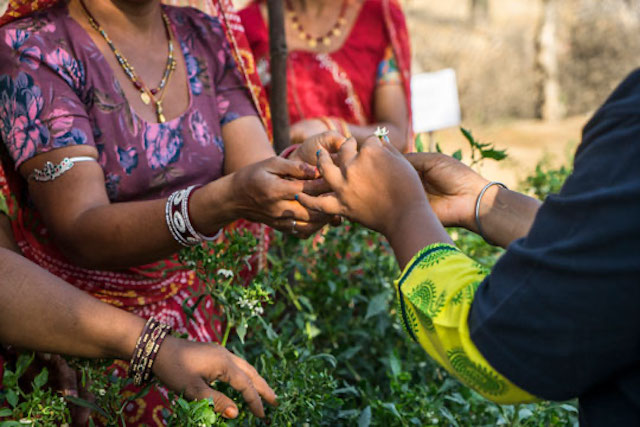Lasting Impact Spotlight: Rukmani Devi
In this series, we check back with TechnoServe program participants who were previously featured on our blog, documenting how their lives have changed and progressed.

Women in Rajasthan, India, receive field training on best practices for developing a kitchen garden.In 2015, TechnoServe partnered with Solvay, L’Oreal, and Henkel on the Sustainable Guar Initiative, a program that worked to increase the income of guar farmers in India’s arid Rajasthan state by at least 25 percent. Guar is a drought-resistant legume with many food and industrial uses. To improve the health and nutrition of guar-producing families, women farmers were trained on developing kitchen gardens: small personal plots of land used to grow a variety of vegetables for household consumption. Growing vegetables in the backyard as opposed to buying them in the market helped families save time and money, and gave women a sense of accomplishment and economic power.
Before, my role was confined to that of a mother and housewife […] Today, I have become an advocate in creating awareness of health and nutrition in my village.
.jpg)
Rukmani Devi was one of these women. She had established a kitchen garden in her village of Dhirera and was growing 10 different vegetables, saving over $20 in a three-month span.
“Ever since I started practicing kitchen gardening in my backyard, my family consumes highly nutritious fresh green vegetables like fenugreek and spinach,” Rukmani mentions in our original blog post, from January 2017. “The training conducted by TechnoServe has been a blessing.”
We caught up with Rukmani again recently:
How is your business doing now?
“Currently, I plant a kitchen garden in all three cropping seasons: rabi (winter), kharif (summer), and zaid (spring). In the rabi season of 2018 alone, I harvested 88 pounds of radish pods, 22 pounds of spinach, 33 pounds of radish, 4 pounds of coriander, and 22 pounds of cumin. My family now consumes vegetables at every meal, and my garden is sufficient to supply the required amount of vegetables. I save $22 on average every month.”
What has changed for you in the last few years?
“I had a chronic headache issue for a few years. I have fully recovered from the illness, which I think is partially because of the daily consumption of fresh vegetables. Before setting up a kitchen garden, my family seldom consumed fresh vegetables. Today, they do not consume a single meal without them.”
“Before, my role was confined to that of a mother and housewife, and my interactions with other people were limited to my family members and to women within my community. Today, I have become an advocate in creating awareness of health and nutrition in my village. I participate in various village-level programs and am also a part of the farmer committee in my village.”
-Sister-(L).jpg)
How are you using your money from your business?
“I save about $22 a month because of the kitchen garden, which I use for necessities such as medical checkups, education expenses, and to purchase good-quality seeds and fertilizers for the guar crop.”
How are you continuing to apply what you learned from TechnoServe?
“I have also trained my sister-in-law in kitchen gardening, and together we have been able to increase the area dedicated to the kitchen garden in our joint family-owned land. I also help other women from the village establish their own kitchen gardens.”
My family now consumes vegetables at every meal, and my garden is sufficient to supply the required amount.
How has your success affected other people?
“I have helped five other women establish kitchen gardens. I also share my experience establishing a kitchen garden and its benefits at various programs, and many other women have decided to establish kitchen gardens as well based on my feedback.”
How has your business and your training from TechnoServe helped you become more resilient to challenges?
“My family does not need to buy vegetables from the market anymore, because the output from the kitchen garden is sufficient to meet the vegetable requirement of my family. Hence, fluctuations in market prices of vegetables don’t affect my family. I can use the money saved by not buying vegetables for better medical care and other household expenses.”



